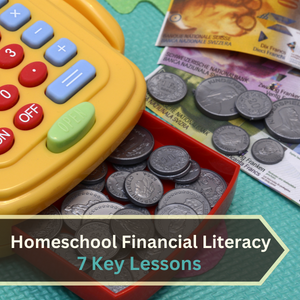Homeschooling has become a vital part of many families’ lives, offering a unique approach to education tailored to individual needs. We’ve pooled this list of tips into this comprehensive guide, which delves deep into various aspects of homeschooling, providing practical advice for newcomers and experienced homeschool parents. From setting up a homeschool environment to maintaining a joyful learning experience, this article has insights and strategies for practical homeschooling.
Exploring the World of Homeschooling
What is Homeschooling, and Why Choose It?
Homeschooling is the practice of educating children at home, under the guidance of their parents or tutors, instead of in a traditional school setting. This home-school approach allows for a highly personalized education, catering to each child’s learning style and pace.
Why do parents choose to homeschool? Common reasons include dissatisfaction with the school system, desire for a more focused educational approach, concerns about the school environment, and the need for flexibility to accommodate a family’s lifestyle or a child’s unique needs.
Homeschooling offers a distinct alternative to traditional schooling. In homeschooling, the environment is often more relaxed, and education is more flexible and customized. Unlike conventional
schools, where education follows a set curriculum and pace, homeschooling allows parents to integrate their values and interests into their children’s education, often leading to a more holistic and experiential learning process.
A Tip for Beginning Your Homeschooling Journey
First Steps to Start Homeschooling
To
start homeschooling, parents should first familiarize themselves with
homeschooling laws and requirements, which can vary significantly by region. Next, curriculum selection is crucial for homeschoolers, ranging from structured schoolwork programs to more eclectic or unschooled approaches. Additionally, setting up a designated learning space at home creates an environment conducive to learning, helping children transition into the homeschooling mindset.
Homeschooling Tips for Parents: The Basics
For parents new to homeschooling or even a homeschool mom, establishing a flexible routine is among the top 10 tips. This routine should balance structured learning with free time, allowing children to explore their interests. Joining local
homeschool groups and connecting with experienced homeschooling families can provide invaluable support and resources.
Structuring the Homeschool Day
Creating an Effective Homeschool Routine
A consistent yet flexible routine helps maintain focus and balance in homeschooling. This includes setting specific times for various subjects and incorporating regular breaks. Tailoring the routine to suit your child’s natural learning rhythms can significantly enhance their learning experience.
Homeschooling Tips and Tricks: Keeping It Fun
Keeping homeschooling enjoyable is critical to sustaining engagement and enthusiasm. This can be achieved by incorporating games, hands-on projects, and real-world learning opportunities into the curriculum. They allow children to have a say in what and how they learn, making the experience more enjoyable.
Curriculum and Instruction
Choosing the Best Homeschool Curriculum Tips
Selecting a homeschool curriculum is a critical decision that shapes the educational journey. It’s essential to consider your child’s learning style, interests, and academic needs. Curriculums can range from traditional textbook-based approaches to more unconventional methods like project-based or experiential learning.
Tips for Teaching Different Subjects
Balancing multiple subjects can be challenging. Focus on core subjects like reading, writing, and math while integrating science, history, and the arts in a way that connects to your child’s world. Using diverse teaching methods, such as visual aids, interactive technology, and practical experiences, can help cater to different learning styles.
Ensuring Social Development in Homeschooled Children
Socialization is a crucial aspect of homeschooling. Homeschooled children can socialize through extracurricular activities, sports teams, community service, homeschool co-ops, and group classes. These activities provide opportunities for interaction, teamwork, and friendship development.
Debunking Socialization Myths in Homeschooling
Some misconceptions are that homeschooled children lack social skills or opportunities for socialization. However, many homeschooled children participate in diverse social activities and often interact with people of various ages, leading to well-rounded social development.
Resources and Support for Homeschooling Families
Maximizing Online and Community Resources
The internet offers many resources for homeschooling families, including educational websites, online courses, and homeschooling forums. Community resources like libraries, museums, and local homeschool groups can also be invaluable for support, materials, and socialization opportunities.
Finding Support and Assistance When Needed
When facing challenges or specialized subjects, seeking external support can be beneficial. Tutors, online courses, and co-op homeschool groups can provide expertise and alternative learning opportunities. Regular interaction with other homeschooling families can offer emotional support and practical advice.
Overcoming Homeschooling Challenges
Tackling Common Homeschooling Obstacles
Common homeschool challenges include managing time effectively, addressing individual learning difficulties, and motivating parents and children. Overcoming these obstacles often involves being flexible with your approach, seeking community support, and continuously adapting to your child’s evolving needs.
Avoiding Burnout: Tips for Homeschool Parents
Parents must set realistic goals, celebrate small successes, and ensure they take time to avoid burnout. Joining support groups, sharing responsibilities with other homeschooling families, or occasionally using tutors can provide necessary breaks and support.
Making Homeschooling Enjoyable for Children and Parents
Creative Learning Activities in Homeschooling
Incorporating creative and hands-on activities can significantly enhance the homeschooling experience. Field trips, science experiments, art projects, and interactive educational games can make learning more dynamic and enjoyable.
Tailoring Education to Your Child’s Needs
One of the most significant tips I can provide for homeschooling is the ability to tailor education to each child’s unique needs and interests. This individualized approach can lead to more engaging and practical teaching, catering to the child’s strengths, weaknesses, and specific learning styles.
Planning for the Future
Homeschooling and College Preparation
For those considering higher education, starting college preparation early is essential. This includes understanding college admission requirements, preparing for standardized tests, and maintaining detailed academic records throughout the homeschooling years.
Fostering Lifelong Learning in Homeschool
Beyond academic achievement, homeschooling can instill a love for lifelong learning. This involves encouraging curiosity, critical thinking, and exploration beyond the standard curriculum, preparing children for a lifetime of learning and adaptation.
In conclusion, homeschooling offers a unique and flexible approach to education tailored to each child’s needs. By understanding the basics, setting up a conducive environment, and utilizing the right resources and strategies, homeschooling can be an enriching experience for both children and parents. Remember, the key to successful homeschooling lies in adapting to your family’s unique situation and embracing the journey with an open mind and heart.




